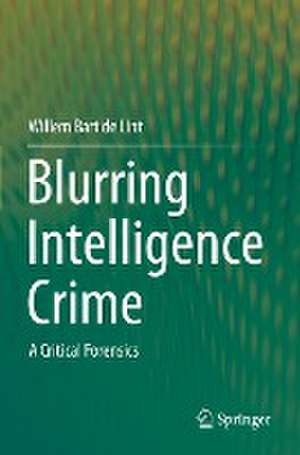Blurring Intelligence Crime: A Critical Forensics
Autor Willem Bart de Linten Limba Engleză Paperback – 16 mar 2022
| Toate formatele și edițiile | Preț | Express |
|---|---|---|
| Paperback (1) | 694.04 lei 6-8 săpt. | |
| Springer Nature Singapore – 16 mar 2022 | 694.04 lei 6-8 săpt. | |
| Hardback (1) | 700.29 lei 6-8 săpt. | |
| Springer Nature Singapore – 15 mar 2021 | 700.29 lei 6-8 săpt. |
Preț: 694.04 lei
Preț vechi: 816.51 lei
-15% Nou
Puncte Express: 1041
Preț estimativ în valută:
132.81€ • 139.01$ • 110.54£
132.81€ • 139.01$ • 110.54£
Carte tipărită la comandă
Livrare economică 31 martie-14 aprilie
Preluare comenzi: 021 569.72.76
Specificații
ISBN-13: 9789811603549
ISBN-10: 9811603545
Ilustrații: XII, 227 p. 11 illus., 9 illus. in color.
Dimensiuni: 155 x 235 mm
Greutate: 0.34 kg
Ediția:1st ed. 2021
Editura: Springer Nature Singapore
Colecția Springer
Locul publicării:Singapore, Singapore
ISBN-10: 9811603545
Ilustrații: XII, 227 p. 11 illus., 9 illus. in color.
Dimensiuni: 155 x 235 mm
Greutate: 0.34 kg
Ediția:1st ed. 2021
Editura: Springer Nature Singapore
Colecția Springer
Locul publicării:Singapore, Singapore
Cuprins
Introduction: Blur and a Critical Forensics of Intelligence Crime.- Forensic Certainties.- Anti-forensics: Intelligence Crime and Blur.- The Events of September 11, 2001: Apex Crime.- Intelligence Crime 1: Let’s not be too Hard on Ourselves.- Intelligence Crime 2: ‘Smear,’ or Crimes Committed by ‘them’.- The Intelligence Crime Blur: Shaping Opinion and Smudging Records.- Conclusion.
Notă biografică
Willem de Lint is Professor in Criminal Justice at Flinders University. Previously, he has served as Head of Sociology, Anthropology, and Criminology at the University of Windsor, Canada and as lecturer in the School of Social and Cultural Studies at the Institute of Criminology, Victoria University of Wellington, New Zealand. His areas of interest include security and policing, public order, security intelligence, and how the governance of public safety and security is conducted by a variety of actors and agencies who are informed by institutional forces.
Textul de pe ultima copertă
This book explores the conundrum that political fortune is dependent both on social order and big, constitutive crime. An act of outrageous harm depends on rules and protocols of crime scene discovery and forensic recovery, but political authorities review events for a social agenda, so that crime is designated according to the relative absence or presence of politics. In investigating this problem, the book introduces the concepts ‘intelligence crime’ and ‘critical forensics.’ It also reviews as an exemplar of this phenomenon ‘apex crime,’ a watershed event involving government in the support of a contested political and social order and its primary opponent as the obvious offender, which is then subject to a confirmation bias. Chapters feature case study analysis of a selection of familiar, high profile crimes in which the motives and actions of security or intelligence actors are considered as blurred or smeared depending on their interconnection in transactional political events, or according to friend/enemy status.
Caracteristici
Provides deployed-and-tested illustrations of the efficacy of apex crime and critical forensics Develops a typology of expected departures from protocols Includes a checklist against which (suspected) apex crimes may be queried and further understood
